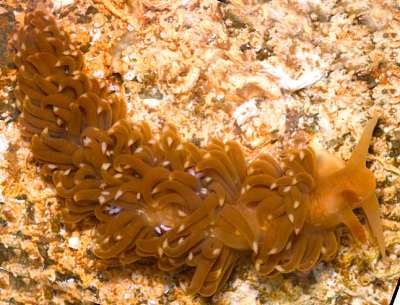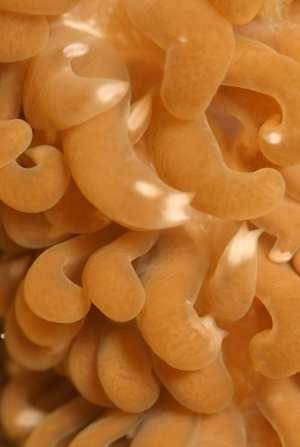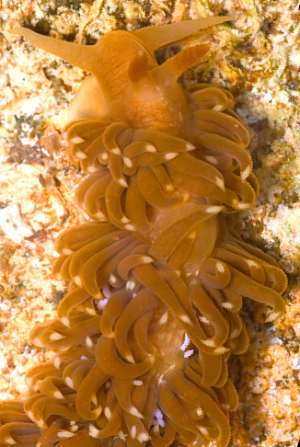Spurilla neapolitana from Saint-Tropez
August 26, 2005
From: Benjamin David-Testanière

Hi,
First sorry for my English ... I'm french photographer who is photographing some sea animals through the water. Recently I have had on my website http://www.bdt-photos.com a sea slug picture.
Locality: Saint-Tropez, la pointe de Capon, France ( département du Var, 83 ) Mditerranean sea. Depth: 20 centimètres. 03 April 2005. Photographer: Benjamin David-Testanière
There was three specimens under a stone. I have put one of them on the stone for the picture.
Can you help me to identify it ?
Thanks to all !
Benjamin David-Testanière
bdt@bdt-photos.com


Dear Benjamin,
This is Spurilla neapolitana. I see from your website you are partial to the beauty of orchids. Spurilla neapolitana is not the most beautiful of nudibranchs, but it has a fascinating biology. It is one of a group that I call 'solar-powered' because they keep small plants alive in their bodies and utilise the sugars the plants produce from photosynthesis. As the plants need sunlight to photosynthesise, Spurilla has developed a network of thin tubes throughout its skin for the plants to live in. You can see them as dark veins on the head and 'neck' in the lower right close-up. See also an earlier message [#7886] which shows these veins more clearly.
Another interesting feature in the lower right your photo are the purplish sausage-shaped objects on its back. They are the egg sacs of a copepod crustacean which seems to occur not uncommonly on this nudibranch. See also the Fact Sheet on symbiosis and an earlier message from Erwin Koehler [#1428] showing an animal heavily infested with these copepods.
In the lower left close-up, the white tips of the of the cerata can be seen in detail. We can see that the white is an elongate sac inside the ceratal tip which we call a cnidosac, because it stores stinging cells [cnidae, nematocysts] from the sea anemones it feeds on. Have a look at the relevant Fact Sheets for more information. Usually there is just one cnidosac at the tip of each ceras, but your close-up seems to have targetted an animal in which there are two cnidsacs and a bifid tip to most of the cerata.
Best wishes,
Bill Rudman
Related messages
-
Re: Sargassum sea slugs in Gulf of Mexico [2]
From: Kathe R. Jensen, February 23, 2010 -
Sargassum sea slugs in Gulf of Mexico [2]
From: Denice Drass, February 22, 2010 -
Feeding Spurilla neapolitana from Florida
From: Linda Ianniello, July 25, 2008 -
Mystery from the Everglades, Florida, USA
From: Sophia Floyd, July 18, 2008 -
Spurilla neapolitana predator
From: Joao Pedro Silva, March 31, 2008 -
Spurilla neapolitana in Brazil
From: Daniel Pimpão, January 23, 2006 -
Mystery from St. Vincent Is, Caribbean [1]
From: Les Wilk, November 3, 2005 -
Re: Spurilla neapolitana from Gulf of Mexico [7]
From: Brian Plankis, September 10, 2005 -
Re: Spurilla neapolitana from Gulf of Mexico [6]
From: Brian Plankis, September 9, 2005 -
Re: Spurilla neapolitana from Gulf of Mexico [5]
From: Brian Plankis, August 30, 2005 -
Identity of Brian Plankis's anemone-feeding aeolid
From: Bill Rudman, August 30, 2005 -
Re: Spurilla neapolitana from Gulf of Mexico [4]
From: Brian Plankis, August 25, 2005 -
Re: Spurilla neapolitana from Gulf of Mexico [3]
From: Brian Plankis, August 20, 2005 -
Re: Spurilla neapolitana from Gulf of Mexico [2]
From: Brian Plankis, August 11, 2005 -
Re: Spurilla neapolitana from Gulf of Mexico [1]
From: Brian Plankis, August 9, 2005 -
Aeolidiella chromosoma or S. neapolitana
From: Nestor E. Ardila E., August 8, 2005 -
Spurilla neapolitana from Gulf of Mexico
From: Brian Plankis, August 8, 2005 -
Spurilla neapolitana from Portugal
From: Ana Maria Rodrigues, August 5, 2005 -
Spurilla neapolitana from Mexico
From: Juan José Alfaro M, June 1, 2005 -
Re: Phestilla melanobrachia from the Solomon Ids
From: Andrej Jaklin, July 22, 2004 -
Anemone-eating slug from Israel
From: Ami Schlesinger, December 24, 2003 -
Spurilla neapolitana? from Jamaica
From: Ross W. Gundersen, October 22, 2003 -
Spurilla neapolitana from the Bahamas
From: Colin Redfern, October 22, 2003 -
Spurilla neapolitana from Portugal
From: Joao Pedro Tojal Loia Soares Silva, August 21, 2003 -
Re: Pruvotfolia pselliotes? from Dakar [2]
From: Juan Lucas Cervera, August 12, 2003 -
Pruvotfolia pselliotes? from Dakar [2]
From: Marina Poddubetskaia, August 9, 2003 -
Solar powered sea-slug
From: Michel Barrabés, September 10, 2002 -
Solar powered sea-slug (2)
From: Michel Barrabés, September 10, 2002 -
Articles about Spurilla neapolitana
From: Daniel Pimpão, May 31, 2002 -
Spurilla chromosoma from Colombia
From: Elianny Dominguez , September 26, 2001 -
Re: Information on Spurilla neapolitana
From: Mike Raffa, September 20, 2001 -
Information on Spurilla neapolitana
From: Amar Boubes, January 2, 2001 -
Spurilla neapolitana from Colombia
From: Phanor Montoya, October 29, 2000 -
About red aeolid from Brazil
From: Carlo Magenta-da-Cunha, April 16, 2000 -
Spurilla neapolitana from Brazil
From: Carlo Magenta-da-Cunha, April 15, 2000 -
Re: Parasitic copepods on Spurilla neapolitana
From: Constantine Mifsud, October 20, 1999 -
Parasitic copepods on Spurilla neapolitana
From: Erwin Koehler, October 16, 1999 -
Spurilla neapolitana from Belize
From: Dave Behrens, October 12, 1999 -
Re: Spurilla neapolitana
From: Constantine Mifsud, September 30, 1999 -
Spurilla neapolitana from Hawaii
From: Scott Johnson, September 30, 1999 -
Re: Spurilla neapolitana photo
From: Constantine Mifsud, September 29, 1999 -
Difference between Spurilla and Berghia
From: Carlo Magenta, September 27, 1999 -
Spurilla neapolitana
From: Bill Rudman, September 27, 1999 -
Spurilla neapolitana - distribution
From: Orso Angulo, June 5, 1999 -
Here is a Spurilla neapolitana photo
From: Erwin Koehler, December 11, 1998 -
Spurilla? from Brazil
From: Carlo Magenta, December 10, 1998
